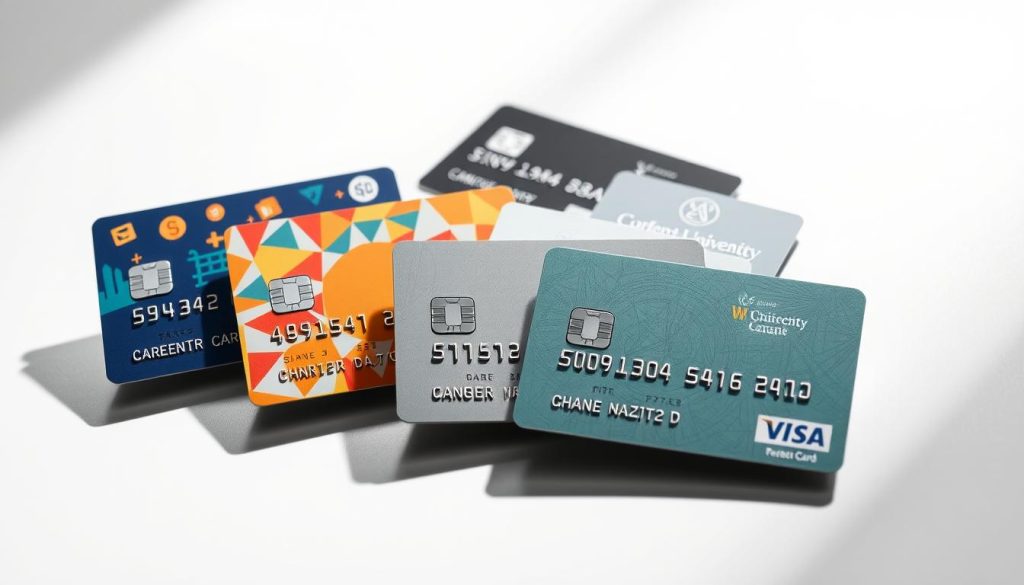Your credit score is key to your financial health. Knowing what affects it can guide your credit card use. Many myths about credit cards can hurt your score. Learning the truth can boost your financial health.

Introduction to Credit Score
It’s important to know the facts about your credit score. This three-digit number shows how reliable you are with money. Misunderstanding credit card myths can lead to bad choices, hurting your score.
Key Takeaways
- Understanding credit card myths can help you improve your credit score
- Your credit score is a vital part of your financial health
- Credit card myths can lead to poor credit decisions
- Knowing the truth about credit card myths can help you manage your credit score effectively
- Separating fact from fiction is crucial when it comes to your credit score
- Credit card myths can harm your credit score if not addressed
Understanding Credit Scores in Today’s Financial Landscape
As you move through the financial landscape, knowing about credit scoring is key. Your credit score is crucial for getting loans, credit cards, and even apartments. The credit scoring system has grown more detailed, considering more factors that affect your score.
In today’s financial landscape, it’s important to know what affects your credit score. These include your payment history, how much credit you use, and how long you’ve had credit. Understanding these can help you improve your credit scoring and reach your financial goals.
- Payment history: On-time payments can help improve your score, while late payments can negatively impact it.
- Credit utilization: Keeping your credit utilization ratio low can help demonstrate responsible credit behavior.
- Credit age: A longer credit history can positively impact your score, as it shows lenders you have a proven track record of managing credit.
By grasping the credit scoring system and what affects your score, you can manage your finances better. This knowledge empowers you to make smart choices in today’s complex financial landscape.
Common Credit Card Myths Debunked: Separating Fact from Fiction
There are many credit card myths that can confuse you. It’s important to know the real credit facts. This way, you can make smart choices about your credit cards.
One myth is that closing old credit cards boosts your score. But, this isn’t always true. Closing accounts can actually lower your credit score. Think carefully before closing any credit cards.
Another myth is that too many credit cards harm your score. While many inquiries can hurt your score, having several cards can show you’re responsible. It’s key to understand how credit card use affects your score.

To get the most from your credit cards, know the credit facts and debunk myths. This way, you can use your cards wisely and keep a good credit score. Remember, myths can mislead, but with the right info, you can make better financial choices.
Some important credit facts to remember are:
- Payment history counts for 35% of your score
- Keep your credit utilization under 30%
- Credit age and mix are also crucial
The Truth About Credit Utilization and Payment History
Two important factors affect your credit score: credit utilization and payment history. Knowing how they impact your score is key to good credit health. Credit utilization is how much credit you use versus what’s available. A low ratio is good, as high usage can hurt your score.
Payment history shows if you’re reliable with credit. Late payments can drop your score a lot. But, on-time payments can boost it. To better your score, use less than 30% of your credit. For instance, with a $1,000 limit, keep your balance under $300.
Also, paying on time is crucial for a good score. Use reminders or automate payments to avoid missing any. By focusing on these, you can improve your score.
- Keep credit utilization below 30%
- Make timely payments to avoid late fees
- Monitor your credit report for errors
Follow these tips to manage your credit score. Understanding credit utilization and payment history is key. This way, you can improve your financial future.
New Credit Applications and Their Real Impact
Understanding the impact of new credit applications on your score is key. Applying for new credit can lead to hard inquiries, which might lower your score temporarily. But, you can lessen this effect by being smart about when and how you apply.
Managing new credit applications well means spreading them out over time. Applying for many credit cards or loans at once can make lenders worry about your creditworthiness. Instead, aim to build a solid credit history by making timely payments and keeping your credit use low.
Here are some tips for handling new credit applications:
- Only apply for credit when necessary
- Space out applications over several months
- Monitor your credit report for errors or inaccuracies
Being careful with new credit applications helps keep your credit score healthy. This opens up better financial opportunities. Always check your credit report and score to stay on track.

Credit Mix and Length of Credit History: What You Need to Know
Two key factors affect your credit score: credit mix and credit history length. Your credit mix shows the variety of credit accounts you have, like credit cards and loans. A diverse mix can boost your score, showing you can handle different credits well.
Your credit history length is also vital. A longer history can increase your score. This is because it gives lenders more insight into your credit habits.
A good credit mix includes both revolving credit (like credit cards) and installment credit (such as loans). This variety shows you can manage different credits and pay on time. A longer credit history also means lenders have more data about you, helping to improve your score.
Here are some tips for a strong credit foundation:
- Check your credit report for accuracy
- Pay bills on time to show good credit habits
- Don’t apply for many credits at once
- Keep old accounts open to lengthen your credit history
Understanding credit mix and history length helps improve your score. Always check your credit report and adjust as needed to stay on track.
Conclusion: Building and Maintaining a Healthy Credit Score
Understanding credit card myths is key to a healthy credit score. By clearing up common misconceptions, you can manage your finances better. This helps you control your financial future.
It’s important to keep an eye on your credit maintenance and pay on time. A low credit utilization and few new credit applications show you’re responsible. Also, having a mix of credit types is good.
Now, you know how to make smart choices for your credit. Use this knowledge to improve and keep your healthy credit score. Take charge of your finances and reach your financial goals.
FAQ
What factors affect my credit score?
Your credit score is based on several key factors. These include your payment history, how much credit you use, and how long you’ve had credit. It also looks at your credit mix and new credit applications.
How often should I check my credit report?
It’s wise to check your credit report at least once a year. This helps you spot any errors or suspicious activity that could harm your score.
Does closing a credit card hurt my credit score?
Closing a credit card can hurt your score. It reduces your available credit and changes your credit utilization ratio. It’s better to keep your cards open, even if you’re not using them.
How much of my available credit should I be using?
Experts say to keep your credit utilization ratio under 30%. This means using less than 30% of your total available credit for the best score.
Does checking my own credit report hurt my score?
No, checking your own credit report is a “soft inquiry.” It doesn’t hurt your score. This includes using credit monitoring services or checking directly with the bureaus.
How long does information stay on my credit report?
Negative info like late payments can stay up to 7 years. But, positive info like on-time payments can stay forever. This helps build your credit history.
Can I remove negative items from my credit report?
Yes, you can dispute any wrong or unverifiable info on your report. If it’s found to be wrong, the bureaus must remove it.
What’s the difference between a hard and soft credit inquiry?
A hard inquiry happens when a lender checks your credit for a loan or card. It can lower your score. A soft inquiry, like checking your own report, doesn’t affect your score.
How can I build credit if I have no credit history?
You can build credit by being an authorized user, getting a secured card, or taking out a credit-builder loan. Making payments on time on these accounts helps establish your credit history.


